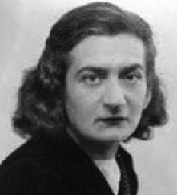Rose Rand facts for kids
Quick facts for kids
Rose Rand
|
|
|---|---|

Rose Rand, 8 February 1949
|
|
| Born | 14 June 1903 |
| Died | July 28, 1980 (aged 77) Princeton, New Jersey, U.S.
|
| Alma mater | University of Vienna |
| Era | Contemporary philosophy |
| Region | Western philosophy |
| School | Analytic philosophy Logical positivism Vienna Circle |
|
Main interests
|
Logic, epistemology philosophy of science |
Rose Rand (June 14, 1903 – July 28, 1980) was a smart logician and philosopher from Austria and America. She was an important member of a famous group called the Vienna Circle.
Contents
Rose Rand's Early Life and Education
Rose (whose full name was Rozalia) Rand was born in a city called Lemberg. This city is now known as Lviv in Ukraine. Her family later moved to Austria. There, she went to a Polish school in Vienna.
Studying at Vienna University
In 1924, Rose started studying at Vienna University. She learned from famous teachers like Heinrich Gomperz, Moritz Schlick, and Rudolf Carnap. She earned her first degree in 1928. Even after graduating, she stayed in touch with her friends from the Vienna Circle.
Rose Rand and the Vienna Circle
While working on her PhD, Rose Rand regularly joined the discussions of the Vienna Circle. This was a group of thinkers who met in Vienna. She kept detailed notes of their talks. She was very active with the group from 1930 to 1935.
Working and Researching
Between 1930 and 1937, Rose worked and did research at a special clinic at Vienna University. She also earned money by teaching students. She gave classes to adults and translated articles about logic from Polish.
Completing Her PhD
In 1937, Rose finished her main work for her PhD. Her thesis was about the ideas of Tadeusz Kotarbiński. She completed her final exam and received her PhD in 1938. However, because she was Jewish, she was not allowed to work in her chosen field.
Facing Challenges and Moving Abroad
Rose faced many difficulties in Vienna before World War II. She was unemployed and had Jewish heritage. In 1939, with help from Susan Stebbing, she moved to London, England. She was considered a Jew without a country.
Life and Work in England
After arriving in England, Rose first worked as a nurse. Later, she was accepted as a "distinguished foreigner" at Cambridge University. There, she attended special classes led by Ludwig Wittgenstein. In 1943, she lost her special status. She then had to work in a metal factory. She also taught night classes in German and psychology at colleges. From 1943 to 1950, she also worked in practical engineering. Karl Popper helped her get a small research grant. This allowed her to study at Oxford University from 1950 to 1954.
Rose Rand in the United States
Rose Rand moved to the United States in 1954. She hoped to find a job teaching at a university. She started by doing research at the libraries of Princeton and Harvard.
Teaching and Research Positions
From 1955 to 1959, she had temporary jobs. She taught basic math, ancient philosophy, and logic. She also worked as a research assistant at the University of Chicago, Indiana University Northwest, and Notre Dame University.
Later Years and Legacy
In 1959, Rose returned to Cambridge, Massachusetts, and then to Princeton, New Jersey. For many years, she earned money from grants and special awards. These were mostly for her work translating the writings of Polish and Russian logicians. When she didn't have grants, she relied on loans, help from friends, freelance translation work, or short-term jobs.
Rose Rand passed away on July 28, 1980, in Princeton. She was 77 years old.
Her important papers are kept at the University of Pittsburgh. These include her research, the notes she took from the Vienna Circle discussions, and over 1,600 letters. She wrote to famous thinkers like Otto Neurath, Ludwig Wittgenstein, and Alfred Tarski. Some of her letters from her time in England are also at Oxford University's Bodleian Library.
 | Jewel Prestage |
 | Ella Baker |
 | Fannie Lou Hamer |

